Whether you're an audiophile, a home theatre enthusiast, or simply someone looking to elevate your listening experience, understanding the nuances of key components of a home theatre system can significantly impact the quality, functionality, and enjoyment of your setup.
In the world of home theatre and audio, queries about AV receivers and amplifiers are common. Many people in the phase of setting up their home sound system wonder ‘do I need an AV receiver?’. We are here to break it down for you, guiding you through the intricacies to make you make informed decisions that resonate with your audio goals.
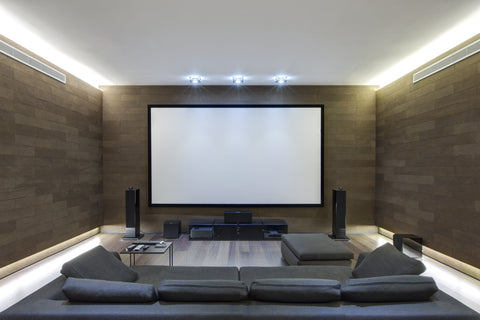
Introduction to AV receivers and amplifiers
At their core, AV receivers and amplifiers serve as the heart and muscle of your home audio system, respectively. An AV receiver is a multi-functional unit that acts as the central hub for audio and video processing, switching, and amplification.
It allows you to connect various sources (like Blu-ray players, turntables, and streaming devices), and manage their output to your speakers and display.
Amplifiers, on the other hand, focus solely on boosting audio signals to drive speakers, offering no video processing or switching capabilities. While they can also be used with certain models of AV Receivers to help boost their performance.
Receiver vs. amplifier: understanding the difference
The distinction between receivers and amplifiers is pivotal in planning your home audio system. A receiver includes an amplifier, but it also incorporates a preamplifier section and a tuner, supporting input switching, audio decoding, and sometimes network connectivity for streaming music.
A power amplifier, with its singular focus on amplifying audio signals, is often employed in high-end audio setups that have high power requirements and benefit from the cleaner power provided by a separate Power Amplifier.
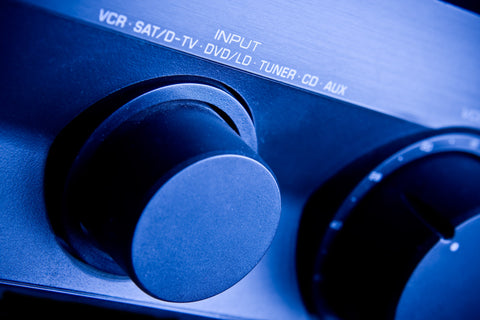
Do you need an AV receiver?
The decision to include an AV receiver in your home audio setup hinges on several factors, primarily the complexity of your system and the quality of your audio-visual experience.
If you're looking to create a surround sound system, integrate multiple sources, or enjoy the convenience of HDMI switching and audio decoding for formats like Dolby Atmos, an AV receiver is crucial. It simplifies connections and provides a unified control centre for your entertainment system.
Higher end systems generally use an AV Processor, which is essentially a higher end version of an AV Receiver with the internal amplification removed.
Can you use two AV receivers together?
In certain scenarios, such as multi-room setups or when seeking to separate audio processing from amplification for high-quality systems, using two AV receivers together may offer benefits.
However, it's essential to understand the challenges this might pose, such as ensuring compatible connections and avoiding signal interference. A more common approach involves pairing an AV receiver with a dedicated amplifier for enhanced power and clarity in demanding speaker setups, rather than utilising two receivers simultaneously.
Do I need a receiver and an amplifier?
The necessity of both a receiver and an amplifier in your system depends on your audio goals. For most home theatre setups, a receiver's built-in amplifier provides sufficient power for standard speakers.
However, if you're aiming for high-level sound quality, particularly in large rooms or with high-end speakers that demand more power than a receiver can provide, adding a separate amplifier can significantly enhance your listening experience.
Are AV receivers good for music?
While AV receivers are traditionally associated with home theatre systems, their suitability for music shouldn't be underestimated. Modern receivers offer a range of features and connections tailored for music lovers, including high-resolution audio support, built-in streaming services, and even phono inputs for turntables. The key is to look for a receiver that prioritises audio quality alongside its video capabilities, ensuring a rich and detailed musical performance.
Musical performance will differ between brands, we usually find Marantz offers some of the best musical performance in their range of AV Receivers. But if you’re getting serious with your music you may want to consider using a 2ch Integrated amplifier which will take your musical playback to the next level.
Unlock your audio potential: explore AV receivers & amplifiers at CHT Solutions now
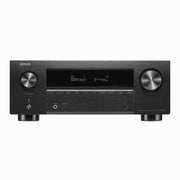
Denon AVC-X3800H 9.4ch 8K AV Receiver
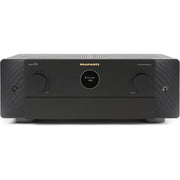
Marantz Cinema 50 Premium 9.4ch AV Receiver
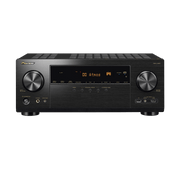
Pioneer VSX-LX305 9.2 Channel AV Receiver - Dirac Live
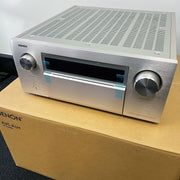
Denon AVC-A1H 15.4ch AV Receiver - Silver Open Box
Understanding the roles and benefits of AV receivers and amplifiers is crucial for anyone looking to build or upgrade their home audio system. While the choice between these components will largely depend on your specific needs and preferences, it's clear that both have their place in enriching your audio-visual experience. Whether you're immersing yourself in the latest blockbuster, spinning your favourite vinyl, or streaming a concert, the right setup will bring unparalleled depth and dimension to your listening and viewing pleasure.
At CHT Solutions, our commitment is to help you navigate these decisions with confidence and clarity, ensuring your home audio system not only meets but exceeds your expectations. Remember, whether you need an AV receiver, an amplifier, or both, the goal is to create an audio experience that truly resonates with you. Get in touch with our friendly team of experts for no-obligation advice on what components are ideal for your setup.







